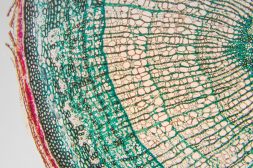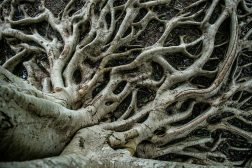Definition
noun, plural: lateral meristems
(botany) A type of meristematic tissue comprised of meristematic cells in the lateral areas of a plant, and is associated with lateral growth
Supplement
Meristematic tissues consist of cells that are actively dividing. They are responsible for the indeterminate growth in plants. They give rise to permanent plant tissues such as vascular tissues, epidermis, phellem, ground tissues, etc. Based on the location of the meristematic tissue, the three different types are: (1) apical meristem (terminal portions), (2) intercalary meristem (at the nodes of certain monocots), and (3) lateral meristem (toward or from the sides).
The lateral meristem is a type of meristem that occurs at the lateral areas of the plant. Thus, it is responsible for the secondary growth of plant, i.e. the increase in girth.
Meristematic tissues may also be classified as either primary (derived directly from embryonic cells) or secondary (derived from permanent tissues). Lateral meristem is an example of a secondary meristem. Sometimes, the two terms are used interchangeably since both of them are concerned with increase in thickness rather than in length (as in primary meristem).
The cork cambium, which gives rise to the periderm, is an example of a lateral meristem.
Synonym(s):
- lateral meristematic tissue
- lateral growth tissue
See also:




